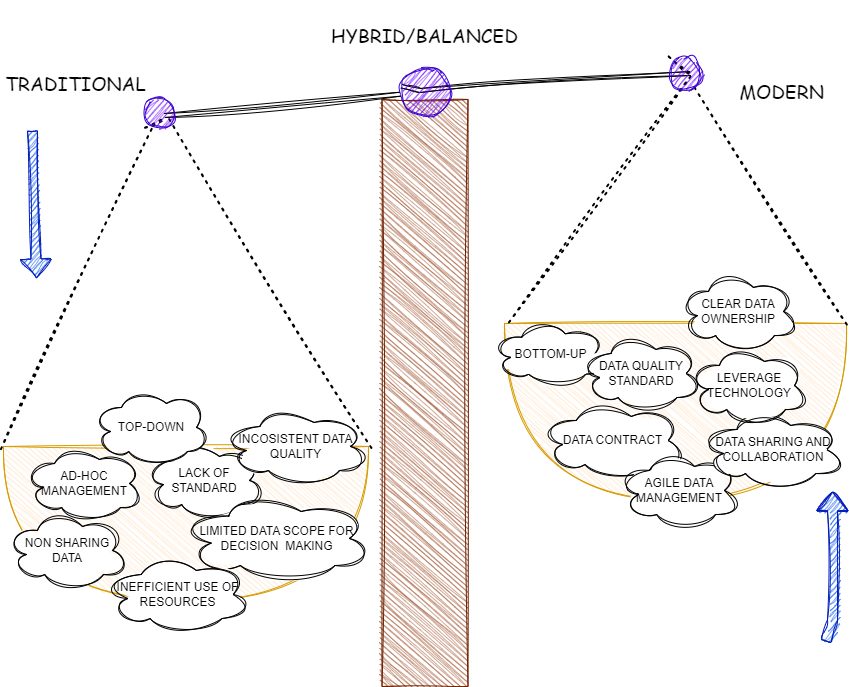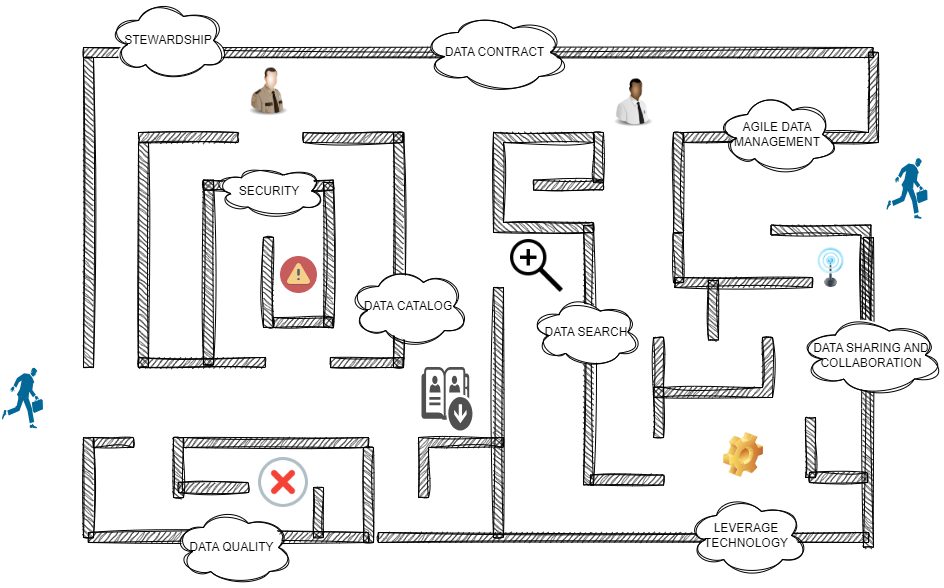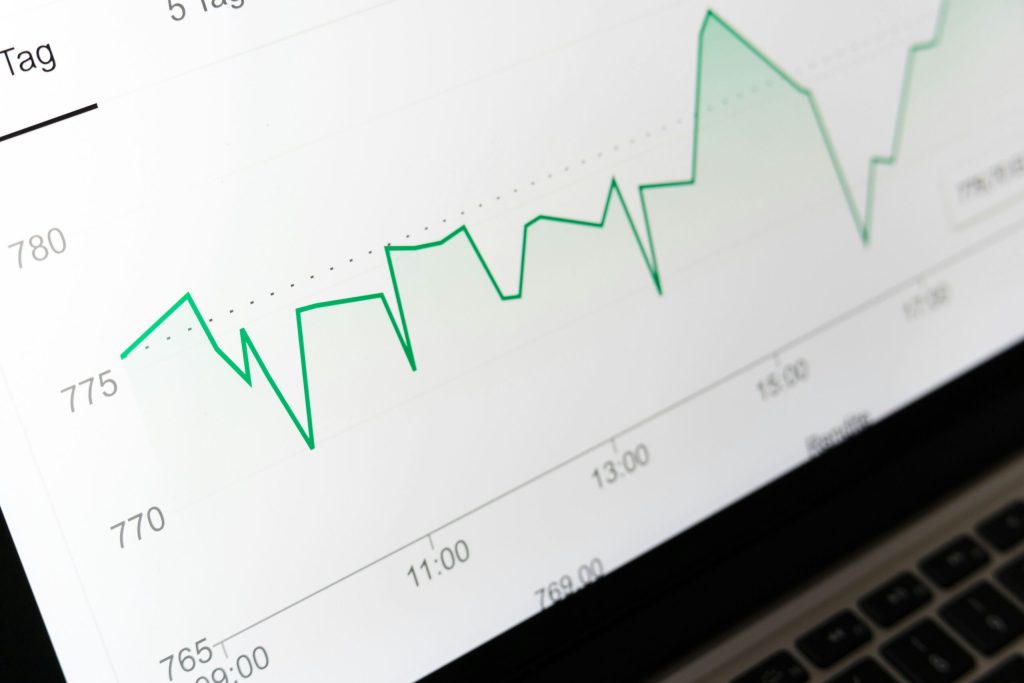Here at CROZ, we often find inspiration in the great characters of mankind. And just as Martin Luther King had a dream, we also have one. Fortunately, we don’t have to deal with the world’s injustice, but what dreams do we have?
We have a dream of a world where data governance is guided by the principles of Martin Luther King: equality and justice for all data.
We have a dream of a world where data is collected, stored, and used in a way that respects the rights and dignity of every row and column, regardless of their source or data quality.
We have a dream of a world where data is used to promote fairness and equity, not perpetuating discrimination and bias.
Aside from dreams, we firmly believe that almost every product or service will soon become digital, at least in some manner. Therefore, we expect that even more business value will be generated from data analysis.
This raises an issue of effective data governance due to:
1. exponential data growth and versatility
2. business complexity
3. growing privacy regulation
4. security threats
5. market growth and opportunities
Following the above, data governance will be crucial for any business that strives to effectively manage and utilize its own data. At its core, data governance is a process of designing and implementing policies and standards used to collect, store, maintain, and use data within the organization. It includes technical and business measures to ensure data is correct, safe, and compliant with relevant laws and regulations.
Given the modern business requirements and often adjustments of existing and emergence of new business models, data governance acts as a facilitator that supports digital transformation, business agility, and fast failed development. Improved data quality, increased collaboration and transparency, enhanced compliance, and increased value of data are some of the benefits of a practical data governance framework, which enables organizations to transform themselves into data-driven organizations.
From a business perspective, data governance is important for several reasons. For one, it ensures that data is accurate and reliable, which is crucial for informed decision-making. For example, if a business considers some business decisions, it must rely on accurate data to make an informed decision. Apart from that, data governance facilitates the protection of sensitive data (e.g. personal data) from unauthorized access and breaches, which can lead to severe legal and financial issues. These issues can easily translate into lawsuits or reputation damage due to data breaches or data misuse.
Another benefit of data governance is that it can enhance the efficiency and productivity of the business. By designing and implementing sound policies and standards for data governance, companies can ensure that all stakeholders are on the same page and that data is being used efficiently. For example, retail companies can benefit from data governance by assuring that data related to inventory, sales, and customers are accurate and consistent in all stores, thereby enabling good business management.
Generally, there are two distinct approaches to data governance: the Traditional approach and the Modern approach. Following, we will briefly elaborate on the difference between these two approaches.

Traditional Approach to Data Governance
Traditionally, data governance was focused on centralized control and data management in a top-down style. This approach often includes a dedicated data governance team consisting of technical and business experts. The leader of the team should be part of the top management team or someone with a similar role and authority. The team leader is responsible for designing and implementing policies and standards of data governance. The team members are responsible for ensuring that data is complete, consistent, and accurate and that they are used in compliance with legal and regulatory requirements.
However, the traditional approach is often rigid and slow in adjustment to the fast-paced business environment. This is because decisions are typically made at the top level of the organization, and afterward, they are passed down to the rest of the organization. This can trigger delays in the implementation of new data-driven initiatives, and it can also impede efficient data sharing between different departments.
Also, it requires lengthy processes of establishing rules and procedures that are often too complex for the context of a fast-paced and constantly adapting environment.
Modern Approach to Data Governance
Unlike the traditional approach, modern data governance focuses on decentralization, bottom-up and top-down management (Hybrid). This means efficient empowerment of individuals and teams within the business to take over the ownership of their own data. The process itself should be incentivized by providing tools and resources that are necessary to efficiently collect, manage, and utilize data.
One of the main benefits of the modern approach is that it is more flexible and adaptable than the traditional approach. This is because the decisions are made on the team level rather than at the top level of the organization. This enables faster implementation of new data-driven initiatives and encourages efficient data sharing.
Another benefit of the modern approach is that it is collaborative and inclusive. This is because it involves the collaboration of all stakeholders, such as business leaders, IT experts, and other data-related roles. It helps to ensure that policies and data governance standards are aligned with the business needs and supported throughout the organization.
This approach instigates the establishment of a data catalog, which is usually an interactive web application that enables users to quickly access information, meaning, and use. Along with data catalog comes the data contract. A data contract is usually established between the providers and users of the data, where they define how the data is shared, terms of use, data quality, access, ownership, etc. Data contracts may even be driven on a blockchain in the form of a smart contract.
It is crucial for this approach that business users are involved from the beginning and provided with information on data catalog and data contract so that they can participate in data democratization, which is the process where data is dispersed on all levels of the organization. Data democratization enables users to efficiently access relevant data, which can spur productivity and innovations across the organization.

Conclusion
In conclusion, both traditional and modern approaches have their own advantages and limitations. The traditional approach focuses more on centralized control and top-down management, while the modern approach focuses on decentralization and bottom-up management with strong business ownership. However, businesses should carefully consider their unique needs and resources when choosing an approach to adopt for their data government strategy.
As for the real-life data governance projects, according to our experience, the truth stands in between. This mixed approach, we call it hybrid, is most likely to be used in data governance projects. The hybrid approach uses elements of the traditional approach as well as the modern one in order to create an optimal data governance framework for a given company.
This kind of approach is a good choice for organizations that are aware of the complex mix of regulatory requirements and opportunities that arise from modern technology. Also, it can be convenient because neglecting issues like legacy systems, organizational culture, or other specific requirements is impossible.
What makes hybrid approach traditional is the process of defining rules and procedures for data management. This may include establishing a data catalog, defining a data dictionary and business glossary, or establishing and enforcing data privacy rules. For example, a given type of organizational culture or company size may require strong top-down leadership in order to efficiently establish data catalog.
On the other hand, the modern part of the hybrid approach may be reflected in the use of technology or in a more flexible and decentralized approach to add value to the process. For example, organizations can use APIs to integrate different applications with data catalogs or use machine learning for the analysis of data to identify data patterns or metadata.
The main benefit of hybrid approach is that organizations can adjust their data management strategy to their specific requirements and therefore build custom data governance framework.
For those interested in data governance, there’s more dishes coming straight out of data governance kitchen. Polish your cutlery!
You know that NIS2/DORA is coming, and you have many initiatives that require strong ownership and elastic data governance to support going to the cloud, developing GenAI, and being compliant simultaneously. Are you struggling to establish a successful Data Governance program? Are you tired of failed programs and wasted resources? We understand the challenges that come with implementing Data Governance, and we are here to help.
Our upcoming blog posts will provide you with the guidance and expertise necessary to benefit from top-down and bottom-up approaches to Data Governance. We are confident that our insights will help you avoid the risk of another failed program.
Here’s a sneak peek of what we’ll cover:
– We will show you how to establish a modern Data Governance program with a Data Governance team that acts as an Enabling Team Type. The team will manage the Data Governance Roadmap, create measures and success factors, mitigate risks, and establish proactive conflict resolution.
– We will guide you through the process of starting a Data Governance framework with an elementary metadata framework, data ownership, data contract, and data observability with data quality.
– We will help you create a Data Governance Community of Practice (CoP) using a Knowledge Graph to publish and share knowledge among stakeholders, platforms & tools, and continuous improvement concepts.
– We will provide you with practical advice on how to set up at least one operational use case in production with clear responsibilities, business meaning, and data lineage. The Data Contract will be supervised by the Data Governance Team and handed over to the Data Governance Community for upcoming business scenarios.
Don’t waste any more time, resources, or opportunities. Let us help you establish a successful Data Governance program that will benefit your organization for years to come. Stay tuned for more!
Falls Sie Fragen haben, sind wir nur einen Klick entfernt.


